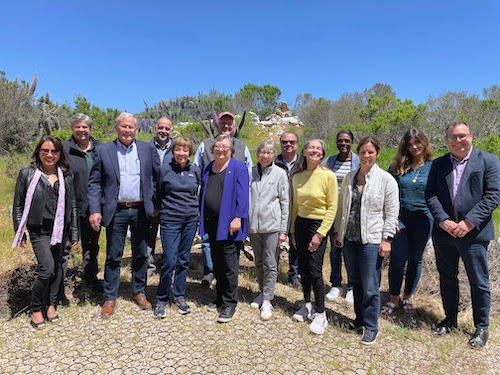Campus News
California State Board of Food and Agriculture visits campus
On April 30, California Department of Food and Agriculture (CDFA) Secretary Karen Ross and members of the California State Board of Food and Agriculture held their April Board meeting at the Hay Barn on the University of California, Santa Cruz campus.

On April 30, California Department of Food and Agriculture (CDFA) Secretary Karen Ross and members of the California State Board of Food and Agriculture held their April Board meeting at the Hay Barn on the University of California, Santa Cruz campus.
The public meeting began with a department update from Secretary Ross. Stacy Philpott, Faculty Director of the Center for Agroecology, Professor of Environmental Studies, and Executive Associate Dean for the campus’s new Agricultural Experiment Station, then shared a presentation on food and agriculture workforce development projects happening at UC Santa Cruz.
These projects include a multi-campus UC partnership to improve and expand undergraduate education in organic agriculture, scholarships to support increased agroecology student retention and preparation for careers in food and agriculture, and a $10 million United States Department of Agriculture (USDA) NextGen grant to cultivate diverse food and agriculture professionals who are equipped to advance equity in food systems. The Board also learned about the agroecology major, unique among food and agriculture degrees in that it is housed in the Division of Social Sciences.
A central theme to the Center for Agroecology’s programming is building a sense of belonging among students, an endeavor that Ross expressed enthusiasm for.
“We have worked hard to create an array of opportunities for our students so that they can choose their own adventure in agroecology research, production agriculture, culinary endeavors, food systems, or community-based service learning,” Philpott shared during her presentation.
Philpott also discussed the campus’s new Agricultural Experiment Station (AES) designation, a system of campus-based scientists with the mission to develop cutting-edge knowledge and technologies to address agricultural, natural resources, and health issues.
“We’re honored to be part of the AES system. Since agriculture has been part of this campus since 1967, it feels very gratifying to be recognized, especially because of our emphasis on social science as it relates to agriculture,” Philpott said.
Glenda Humiston, Board member and vice president of the UC Division of Agriculture and Natural Resources (ANR) thanked Philpott and Division of Social Sciences Dean and UC Santa Cruz AES Dean Katharyne Mitchell for their collaboration with UC ANR as they have been integrating AES into the overall system. UC Santa Cruz currently hosts the first-ever UC ANR assistant Cooperative Extension Specialist devoted to organic agriculture across the state, as well as an assistant Cooperative Extension Specialist focused on agroecology.
The Board shared their enthusiasm for the programs they heard about during the presentation. “I’m impressed with how many students your programs have had an impact on and how many communities across the state you’ve touched. It’s very impressive,” shared Board member and Vice President of Agriculture at Lundberg Family Farms Bryce Lundberg.
After presentations about land conservation efforts in Santa Cruz County and beyond from representatives of the Land Trust of Santa Cruz County, Elkhorn Slough, and Peninsula Open Space Trust, the visitors were treated to a tour of the UC Santa Cruz Farm, the oldest certified-organic university farm in the nation, led by Center for Agroecology Executive Director Darryl Wong.
During the tour, Wong explained to the visitors the many opportunities available to UC Santa Cruz students to get involved with and inspired by agriculture.
“Maybe some students don’t see themselves running a tractor or growing row crops, but they see a project like the Community Herb Garden, where students are connecting with their culture through plants, and want to get involved with that,” Wong said “We need to create all these different onramps for students to find themselves in food and agriculture.”
With the campus’s new AES designation, UC Santa Cruz and the Center for Agroecology have seen increased support and collaboration within the UC system and at the state and federal level. One such collaboration is the new USDA Southwest Regional Food Business Center that advances resilient food systems by supporting farmers, ranchers, and other food businesses in accessing new markets and navigating federal, state, and local resources.
“When we first started out, we wanted to prove we could grow food without using chemicals. Now, with the AES designation, it’s more important than ever for us to connect the groundbreaking research within the UC system to these questions about sustainable production, and support the communities and the people who grow our food,” Wong shared with the group.